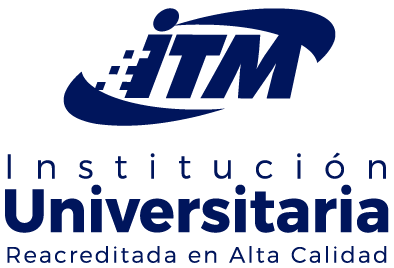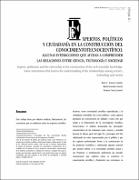Mostrar el registro sencillo del ítem
Expertos, políticos y ciudadanía en la construcción del conocimiento tecnocientífico. Algunas interacciones que ayudan a comprender las relaciones entre ciencia, tecnología y sociedad
| dc.contributor.author | Estévez Cedeño, Betty | |
| dc.contributor.author | González García, Marta | |
| dc.contributor.author | Ursua Lezaun, Nicanor | |
| dc.date.accessioned | 2019-07-16T17:02:22Z | |
| dc.date.accessioned | 2019-08-23T16:04:28Z | |
| dc.date.available | 2019-07-16T17:02:22Z | |
| dc.date.available | 2019-08-23T16:04:28Z | |
| dc.date.issued | 2010-10-20 | |
| dc.identifier | https://revistas.itm.edu.co/index.php/trilogia/article/view/92 | |
| dc.identifier | 10.22430/21457778.92 | |
| dc.identifier.uri | http://hdl.handle.net/20.500.12622/1158 | |
| dc.description.abstract | Este trabajo tiene por objetivo analizar, básicamente, las conexiones que se establecen entre los expertos científico-técnicos, como comunidad científica especializada, y la ciudadanía entendida ésta como público, como agencia portadora de conocimiento de utilidad y como ente que ayuda a la financiación de la investigación científica. Comenzamos el análisis destacando las principales características de las relaciones entre ciencia y sociedad durante la última parte del siglo XX y principios del XXI, enfatizando los roles representados por el público y por los expertos profesionales frente a la construcción de los productos científicos y subrayando algunos criterios que pueden definir a la comunidad científica actual y sus fronteras. A continuación analizamos las actuales concepciones que explican cómo se construye el conocimiento científico y finalmente nos centramos en los criterios de adaptación que ha de tomar en cuenta una nueva propuesta teórica: la gobernanza deliberativopluralista que permite comprender las nuevas relaciones entre expertos, políticos y ciudadanos, y que ha de ser entendida como una versión actualizada de la política científica, concibiendo ésta como uno de los instrumentos más apropiados para orientar la investigación científica y tecnológica. La propuesta de la gobernanza deliberativopluralista reconoce la importancia de la participación ciudadana en la construcción del conocimiento y considera su inclusión en la toma de decisiones un criterio justo y democrático, orientado por la idea de alcanzar un mayor bienestar social. | spa |
| dc.format.mimetype | application/pdf | |
| dc.language.iso | spa | |
| dc.publisher | Instituto Tecnologico Metropolitano (ITM) | spa |
| dc.relation | https://revistas.itm.edu.co/index.php/trilogia/article/view/92/91 | |
| dc.rights | Derechos de autor 2017 trilogía Ciencia Tecnología Sociedad | spa |
| dc.source | 2145-7778 | |
| dc.source | 2145-4426 | |
| dc.source | Trilogía Ciencia Tecnología Sociedad; Vol 2 No 3 (2010); 15-37 | eng |
| dc.source | Trilogía Ciencia Tecnología Sociedad; Vol. 2 Núm. 3 (2010); 15-37 | spa |
| dc.subject | Ciudadanos | spa |
| dc.subject | Comunidad científica especializada | spa |
| dc.subject | Políticos | spa |
| dc.subject | Gobernanza deliberativopluralista | spa |
| dc.subject | Política científica | spa |
| dc.subject | Participación ciudadana | spa |
| dc.title | Expertos, políticos y ciudadanía en la construcción del conocimiento tecnocientífico. Algunas interacciones que ayudan a comprender las relaciones entre ciencia, tecnología y sociedad | spa |
| dc.title.alternative | Experts, politicians and the citizenship in the construction of the tech-scientific knowledge. Some interactions that lead to the understanding of the relationships among science, technology and society | |
| dc.subject.keywords | Citizens | eng |
| dc.subject.keywords | specialized scientific community | eng |
| dc.subject.keywords | politicians | eng |
| dc.subject.keywords | deliberative-pluralist government | eng |
| dc.subject.keywords | scientific politics | eng |
| dc.subject.keywords | citizen participation. | eng |
| dc.type | info:eu-repo/semantics/article | |
| dc.type | info:eu-repo/semantics/publishedVersion | |
| dc.type | Articles | eng |
| dc.type | Artículos | spa |
| dc.relation.ispartofjournal | Trilogía Ciencia Tecnología Sociedad | |
| dc.description.abstractenglish | The main objective of this work is to analyze, basically, the connections that are established among the techscientific experts, as a specialized scientific community, and the citizenship taken as the public, as a bearer agency of knowledge of utility and as a body that helps to the financing of the scientific investigation. We started the analysis by enhancing the principal characteristics of the relationship between science and society during the last part of the XX century and the beginnings of the XXI, focusing on the represented roles by the public and by the professional experts facing the construction of the scientific products and underlining some criteria that can define the current scientific community and their frontiers. Next, we analyzed the current conceptions which explain the way the scientific knowledge is constructed and finally we focused on the adaptation criteria when taking into account a new theoretical proposal: the deliberative – pluralist government that leads to the understanding of new relationships among experts, politicians and citizens, and that must be understood as an updated version of the scientific politics, conceiving this as one of the most appropriated tools to guide the scientific and technological investigation. The proposal of the deliberative – pluralist government acknowledges the relevance of the citizenship participation in the construction of the knowledge and it considers the inclusion of a fair and democratic judgment in the decisions making, guided by the idea of reaching a better social welfare. | eng |
| dc.rights.accessrights | info:eu-repo/semantics/openAccess | |
| dc.type.coar | http://purl.org/coar/resource_type/c_6501 |
Ficheros en el ítem
Este ítem aparece en la(s) siguiente(s) colección(ones)
-
Vol. 2 Núm. 3 (2010) [12]


